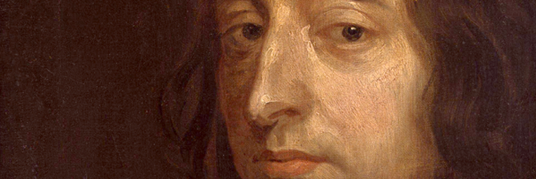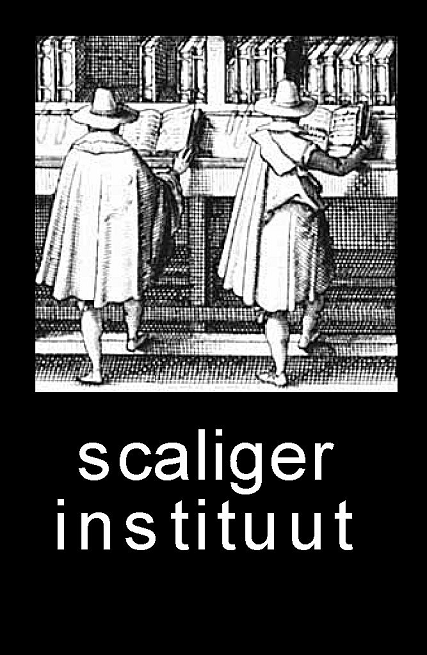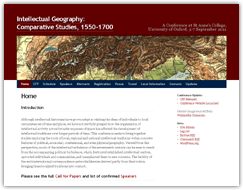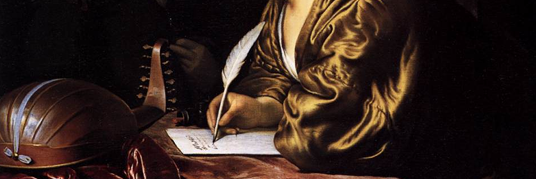
The Project is delighted to announce the presentation of transcriptions of almost all of the surviving correspondence of the jurist, historian, Hebraist, and polymath John Selden (1584–1654). The transcriptions have been generously provided by Professor Gerald J. Toomer, who prepared them (originally for his own research purposes, not for publication) in the course of the research for his magnum opus John Selden: A Life in Scholarship (Oxford: Oxford University Press, 2009). Selden, many of whose letters survive among the holdings of the Bodleian Library, was widely regarded as the most important scholar in Britain in the seventeenth century. He was a major antiquary and historian of English law, whose work was unrivalled before Maitland in the nineteenth century. He was also a central figure in the transmission of Oriental learning to the West, and was acknowledged in his lifetime as one of the greatest Christian authorities on Jewish law and history. He encouraged the study of Arabic, and produced the first English edition of an Arabic text. He was also an internationally recognised theorist of international law (in his Mare Clausum) and natural law (De Iure Naturali et Gentium). His works were caught up in many of the most controversial religious and political issues of the day, provoking praise and polemic in Britain and Europe. His correspondence network extended to northern Europe and eastwards to Aleppo.
The discussions which led to Professor Toomer’s generous agreement to the presentation of these transcriptions on our website were initiated at and facilitated by the international conference John Selden, 1584-1654: Scholarship in Context (Magdalen College, Oxford, 24-26 June 2010), organized by Thomas Roebuck and Jeffrey Miller in association with the Centre for Early Modern Studies and the Centre for the Study of the Book.
The transcriptions will be available in a fully searchable form within our union catalogue at its launch in September 2011. In the interim, we are pleased to be able to provide them as a pdf file (13.5 MB).
Please note that the copyright of the transcriptions remains with Professor Toomer, and that you should not quote from them in papers or scholarly publications without prior written permission (please contact the Project in the first instance). Professor Toomer would also like it to be emphasised that the document is not a conventional scholarly edition, and should not be judged by those standards; the transcriptions were prepared for private use rather than for publication, and in most cases have not been checked against the originals.

Bodleian Library, Lister Copperplates 858 (plate 787), Conus Marmoreus

When it came time to publish Historiae Conchyliorum, Lister also called upon the scientific and artistic expertise of his two daughters, Susanna and Anna Lister, who were the primary draftswomen for the copperplates and who may well have been the first women to use a microscope to assist them with their scientific illustrations.
Susanna and Anna’s copperplate etchings and other scientific drawings are currently being featured in an article and slideshow on the news page of the journal Nature, and the women’s role in early science is one of the topics discussed in Roos’s forthcoming biography of Lister, Spiderman: Martin Lister (1639-1712), Naturalist and Physician.
A collection-level description of Martin Lister’s manuscripts in the Bodleian, as well as a description of Martin Lister’s books now held by the Bodleian, are available on the library’s website. The copperplates are kept in preservation envelopes and individual plates can be located using a handlist available from the Bodleian Rare Books Section (rare.books(at)bodleian.ox.ac.uk).

Scaliger Instituut
The Scaliger Institute and Brill publishers invite scholars and researchers to send in proposals for the 2011 Brill Fellowship at the Scaliger Institute of Leiden University Library.
Brill, the oldest scholarly publishing house in The Netherlands based in Leiden since 1683, is sponsoring the Scaliger Institute for the period 2006-2012. This contribution provides an opportunity for one or two fellows to come to Leiden University Library each year in order to do research in the library’s rich Special Collections.
The Brill fellowship is intended for a minimum period of three months. The allowance, which is intended to cover the costs of accommodation and research, is €1000 per month. Applications can be submitted by mail and post to the board of the Brill fellowship.
The prospective fellow must be involved in one of the following main subject areas of Brill: Middle East and Islamic Studies; Asian Studies; Medieval and Early Modern History; Biblical and Religious Studies; Ancient Near East and Egypt and Classical Studies. The Brill fellow is expected to contribute to the activities of the Scaliger Institute and to give a public lecture. When the occasion arises, the lecture will be published by Brill in association with the Scaliger Institute.
The closing date for applications of the Brill fellowship 2011 is 31 January 2011. For more information and the application form, visit the Fellowship website.
 The CFP for the next Project conference, Intellectual Geography: Comparative Studies, 1550-1700, to be held at St Anne’s College, University of Oxford from 5-7 September 2011, has now been released. Confirmed keynote speakers include Professor Miles Ogborn (Queen Mary, University of London) and Professor Thomas DaCosta Kaufmann (Princeton University). The conference will explore prospects for an analytical geography of the concrete spatial features both underpinning national and international networks of learned correspondence and nurturing the intellectual traditions exchanged through those networks. It will examine the material conditions structuring epistolary communication, the geographical features conditioning local, regional, and national intellectual traditions, and the ideas generated when international networks brought these localized traditions into contact. At the centre of the conference will be a comparison of how the radically different physical, political, and confessional geographies of England and the Holy Roman Empire structured intellectual activity in manners radically different and hitherto unappreciated, and how the wars and reformations of the seventeenth century cross-fertilized these traditions in highly significant ways. The deadline for abstracts is 1 April 2011. For the full CFP, please visit the conference microsite.
The CFP for the next Project conference, Intellectual Geography: Comparative Studies, 1550-1700, to be held at St Anne’s College, University of Oxford from 5-7 September 2011, has now been released. Confirmed keynote speakers include Professor Miles Ogborn (Queen Mary, University of London) and Professor Thomas DaCosta Kaufmann (Princeton University). The conference will explore prospects for an analytical geography of the concrete spatial features both underpinning national and international networks of learned correspondence and nurturing the intellectual traditions exchanged through those networks. It will examine the material conditions structuring epistolary communication, the geographical features conditioning local, regional, and national intellectual traditions, and the ideas generated when international networks brought these localized traditions into contact. At the centre of the conference will be a comparison of how the radically different physical, political, and confessional geographies of England and the Holy Roman Empire structured intellectual activity in manners radically different and hitherto unappreciated, and how the wars and reformations of the seventeenth century cross-fertilized these traditions in highly significant ways. The deadline for abstracts is 1 April 2011. For the full CFP, please visit the conference microsite.
Kim McLean-Fiander
November 12, 2010
Calls for Papers, Conferences and Workshops, Events, Project Updates
Tags: Censorship, Commerce, Communication, Exchange, Networks, Propaganda, Seventeenth Century

A Woman Writing a Letter (1680) by Frans van Mieris
The University of Reading Early Modern Studies Conference will take place 18–20 July 2011. Organised by the Early Modern Research Centre, the conference takes as its theme Communication and Exchange and will feature both a panel on Cultures of Knowledge and a plenary session by the Project Director Professor Howard Hotson. The conference hopes to generate new thinking and debate on such questions as: what forms did communication and information take (oral, printed, numerical, or even visual), how did its forms change, and how was it circulated; what did people know about the world outside their own immediate spheres in the early modern period; what new techniques for the calculation and expression of information appeared; how far was information managed by government through propaganda and censorship or the maintenance of secrecy; did changing practices of communication stimulate the emergence of new genres; how did the stock of knowledge of the world increase through the endeavours of seamen, merchants, factors and adventurers as well as scientists and travel writers; and what part did patronage and the commerce in books and manuscripts play? The deadline for paper and panel proposals is 31 January 2011. Further details are available in the full call for papers (pdf).
Kim McLean-Fiander
November 12, 2010
Conferences and Workshops, Events, Project Updates, Projects and Centres
Tags: Bodleian Resources, Databases, Digital Miscellanies Index, Digitization, Eighteenth Century, Electronic Enlightenment, Seventeenth Century, Union Catalogue
A report on the roundtable is now available on the CEMS blog
 On Thursday 18 November 2010, the Centre for Early Modern Studies (CEMS) at Oxford will host a roundtable presentation of three early modern digital projects, comprising Cultures of Knowledge (James Brown), Electronic Enlightenment (Robert McNamee), and the Digital Miscellanies Index (Abigail Williams and Jennifer Batt). The event will take place from 12.30-2.00pm at the Oxford e-Research Centre, 7 Keble Road. Tea and coffee will be provided, but please bring your own lunch. For more information, visit the CEMS website.
On Thursday 18 November 2010, the Centre for Early Modern Studies (CEMS) at Oxford will host a roundtable presentation of three early modern digital projects, comprising Cultures of Knowledge (James Brown), Electronic Enlightenment (Robert McNamee), and the Digital Miscellanies Index (Abigail Williams and Jennifer Batt). The event will take place from 12.30-2.00pm at the Oxford e-Research Centre, 7 Keble Road. Tea and coffee will be provided, but please bring your own lunch. For more information, visit the CEMS website.









 Join
Join 